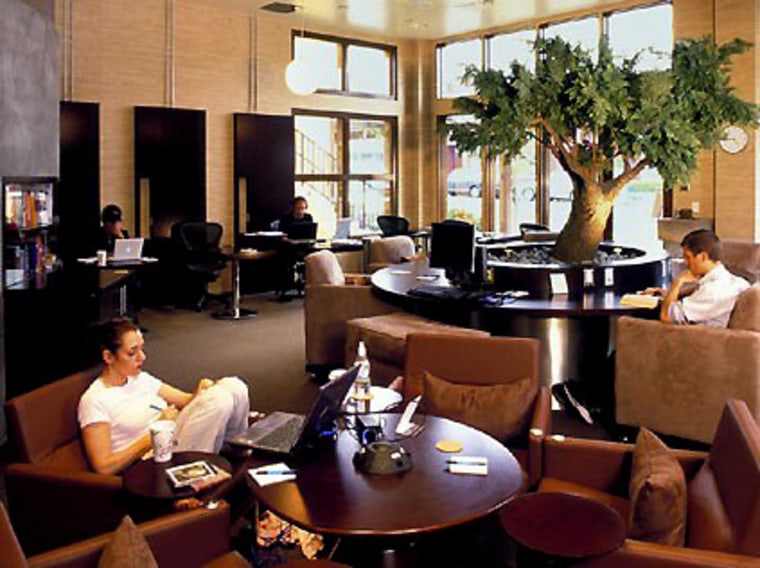In the earliest stage of his startup Darius Roberts, 27, shared the de facto office of many a San Francisco techie: A coffee shop.
Working out of a Wi-Fi-enabled java joint in the Mission district was infinitely more pleasant and productive for him than flying solo in a home office at his Oakland apartment. And it provided the opportunity to meet other developers he might even be able to hire one day, as his Web-based car-sharing company, DartCar, grew.
But when Roberts picked up a flyer about a "community office space" called the Hat Factory, he realized there was an even better option. For $10 a day or $170 per month, the Hat Factory could provide him with a desk, standard office amenities, and access to a shared kitchen, private meeting room, and lounge. And something else — community spirit. "You can meet people at a coffee shop, but it's harder to have meaningful interactions," Roberts says. "Co-working lends itself to that."
Over the past few years, co-working facilities — both grassroots, co-op-like versions and for-profit models — have started popping up across the country and the world, from Seattle to Copenhagen. A co-working wiki hosts pages for dozens of other cities with co-working initiatives in progress. And while the concept of shared office space is nothing new to entrepreneurs, an increasing number of them are signing on and finding that the community-building and networking benefits outweigh even the virtues of a shared fax machine.
In a recent report on the future of small business, the Silicon-Valley based Institute for the Future pegged co-working as a trend to watch over the next decade. After co-working first took off with clusters of free-agent programmers and writers, its flexibility and low cost have also proven a good match for startups unwilling to sign a long-term lease. Because many of these facilities operate on a gym-membership model that doesn't assign workers to specific desks, co-working is cheaper than most subleasing arrangements. And unlike traditional business incubators, co-working isn't just for startups with high-growth potential.
The study's lead author, Steve King, says the increasing popularity of co-working facilities reflects the rise of one-person "personal businesses" as well as a broader fluidity between virtual and real-world communities.
"When we talk to small-business people about their personal businesses, the biggest complaint we hear is about loneliness and the lack of social networks," King says. Although "virtual offices" can fulfill the physical needs of many free agents by providing a mailing address, phone services, and meeting rooms as needed, co-working facilities help fill the social needs people have as well—either informally, by simply bringing together a group of people with similar interests, or formally, through networking events, holiday parties, and even softball leagues.
Fostering community spirit wasn't part of the business plan when Jude Siddall and her husband Gary Romain founded Seattle-based ActivSpace during the mini-storage boom of the mid-'90s. Their idea—renting out small rooms in no-frills warehouse-style buildings—was a hit with hobbyists and small-business owners looking for a low-cost way to reclaim their basements and garages. Though the buildings weren't designed with any community spaces (too expensive), Liddell found that tenants clamored for community anyway, using empty suites to throw wine and cheese parties. The newest ActivSpace, now under construction in San Francisco's Mission district, will be the first with a dedicated gathering place, in the form of a cafe.
And as more developers get into co-working, community atmosphere will likely become an even more important differentiator. When John McGann founded his co-working space, 116 West Houston, in New York City eight years ago, he hoped the open design would attract creative types searching for an alternative to corporate cubicle farms. With no walls or partitions, "the space really fosters collaboration," he says, and that has proven appealing to entrepreneurs as well as writers, designers, and artists.
Marketing and massages
This month, McGann started a renovation project to triple the amount of public space — removing desks to make way for a small conference room and a larger lounge area, complete with a hammock for power naps. He's also planning to open more specialized co-working facilities targeted to specific industries — another growing trend, King says.
Other co-working facilities say that more mixed groups have benefits for small businesses, too. As a nonprofit management consultant, Eva Schweber says it was always a challenge to find other microbusinesses she could turn to when she needed a vendor or subcontractor. Bringing people in small businesses together was central to her idea for Portland, Ore.-based CubeSpace, a co-working facility that opened in October. In addition to offering on-site networking events and community spaces, CubeSpace leverages the skills of its members to offer value-added services like assistance with marketing, graphic design, and Web development. A member masseuse even stops by to offer discounted massages.
One of the newest co-working facilities, for-profit Indoor Playground, opened in Toronto on Feb. 1 with a mission statement focused solely on supporting local entrepreneurial activity. The space's hanging dividers and movable desks allow for reconfigurable work areas that can accommodate growing businesses as well as community events. Those events are planned by members themselves, both in person and through wikis.
Indoor Playground co-founder Mark Dowds calls it a hands-off approach to business incubation: "We created an environment — an open space where people can find each other, collaborate, and create great ideas. Then we'll see what happens."
